nmu_em
Matthew Stephens
2025-02-23
Last updated: 2025-02-27
Checks: 7 0
Knit directory: misc/analysis/
This reproducible R Markdown analysis was created with workflowr (version 1.7.1). The Checks tab describes the reproducibility checks that were applied when the results were created. The Past versions tab lists the development history.
Great! Since the R Markdown file has been committed to the Git repository, you know the exact version of the code that produced these results.
Great job! The global environment was empty. Objects defined in the global environment can affect the analysis in your R Markdown file in unknown ways. For reproduciblity it’s best to always run the code in an empty environment.
The command set.seed(1) was run prior to running the
code in the R Markdown file. Setting a seed ensures that any results
that rely on randomness, e.g. subsampling or permutations, are
reproducible.
Great job! Recording the operating system, R version, and package versions is critical for reproducibility.
Nice! There were no cached chunks for this analysis, so you can be confident that you successfully produced the results during this run.
Great job! Using relative paths to the files within your workflowr project makes it easier to run your code on other machines.
Great! You are using Git for version control. Tracking code development and connecting the code version to the results is critical for reproducibility.
The results in this page were generated with repository version f82707c. See the Past versions tab to see a history of the changes made to the R Markdown and HTML files.
Note that you need to be careful to ensure that all relevant files for
the analysis have been committed to Git prior to generating the results
(you can use wflow_publish or
wflow_git_commit). workflowr only checks the R Markdown
file, but you know if there are other scripts or data files that it
depends on. Below is the status of the Git repository when the results
were generated:
Ignored files:
Ignored: .DS_Store
Ignored: .Rhistory
Ignored: .Rproj.user/
Ignored: analysis/.RData
Ignored: analysis/.Rhistory
Ignored: analysis/ALStruct_cache/
Ignored: data/.Rhistory
Ignored: data/methylation-data-for-matthew.rds
Ignored: data/pbmc/
Ignored: data/pbmc_purified.RData
Untracked files:
Untracked: .dropbox
Untracked: Icon
Untracked: analysis/GHstan.Rmd
Untracked: analysis/GTEX-cogaps.Rmd
Untracked: analysis/PACS.Rmd
Untracked: analysis/Rplot.png
Untracked: analysis/SPCAvRP.rmd
Untracked: analysis/abf_comparisons.Rmd
Untracked: analysis/admm_02.Rmd
Untracked: analysis/admm_03.Rmd
Untracked: analysis/bispca.Rmd
Untracked: analysis/cache/
Untracked: analysis/cholesky.Rmd
Untracked: analysis/compare-transformed-models.Rmd
Untracked: analysis/cormotif.Rmd
Untracked: analysis/cp_ash.Rmd
Untracked: analysis/eQTL.perm.rand.pdf
Untracked: analysis/eb_prepilot.Rmd
Untracked: analysis/eb_var.Rmd
Untracked: analysis/ebpmf1.Rmd
Untracked: analysis/ebpmf_sla_text.Rmd
Untracked: analysis/ebspca_sims.Rmd
Untracked: analysis/explore_psvd.Rmd
Untracked: analysis/fa_check_identify.Rmd
Untracked: analysis/fa_iterative.Rmd
Untracked: analysis/flash_cov_overlapping_groups_init.Rmd
Untracked: analysis/flash_test_tree.Rmd
Untracked: analysis/flashier_newgroups.Rmd
Untracked: analysis/flashier_nmf_triples.Rmd
Untracked: analysis/flashier_pbmc.Rmd
Untracked: analysis/flashier_snn_shifted_prior.Rmd
Untracked: analysis/greedy_ebpmf_exploration_00.Rmd
Untracked: analysis/ieQTL.perm.rand.pdf
Untracked: analysis/lasso_em_03.Rmd
Untracked: analysis/m6amash.Rmd
Untracked: analysis/mash_bhat_z.Rmd
Untracked: analysis/mash_ieqtl_permutations.Rmd
Untracked: analysis/methylation_example.Rmd
Untracked: analysis/mixsqp.Rmd
Untracked: analysis/mr.ash_lasso_init.Rmd
Untracked: analysis/mr.mash.test.Rmd
Untracked: analysis/mr_ash_modular.Rmd
Untracked: analysis/mr_ash_parameterization.Rmd
Untracked: analysis/mr_ash_ridge.Rmd
Untracked: analysis/mv_gaussian_message_passing.Rmd
Untracked: analysis/nejm.Rmd
Untracked: analysis/nmf_bg.Rmd
Untracked: analysis/nonneg_underapprox.Rmd
Untracked: analysis/normal_conditional_on_r2.Rmd
Untracked: analysis/normalize.Rmd
Untracked: analysis/pbmc.Rmd
Untracked: analysis/pca_binary_weighted.Rmd
Untracked: analysis/pca_l1.Rmd
Untracked: analysis/poisson_nmf_approx.Rmd
Untracked: analysis/poisson_shrink.Rmd
Untracked: analysis/poisson_transform.Rmd
Untracked: analysis/qrnotes.txt
Untracked: analysis/ridge_iterative_02.Rmd
Untracked: analysis/ridge_iterative_splitting.Rmd
Untracked: analysis/samps/
Untracked: analysis/sc_bimodal.Rmd
Untracked: analysis/shrinkage_comparisons_changepoints.Rmd
Untracked: analysis/susie_cov.Rmd
Untracked: analysis/susie_en.Rmd
Untracked: analysis/susie_z_investigate.Rmd
Untracked: analysis/svd-timing.Rmd
Untracked: analysis/temp.RDS
Untracked: analysis/temp.Rmd
Untracked: analysis/test-figure/
Untracked: analysis/test.Rmd
Untracked: analysis/test.Rpres
Untracked: analysis/test.md
Untracked: analysis/test_qr.R
Untracked: analysis/test_sparse.Rmd
Untracked: analysis/tree_dist_top_eigenvector.Rmd
Untracked: analysis/z.txt
Untracked: code/multivariate_testfuncs.R
Untracked: code/rqb.hacked.R
Untracked: data/4matthew/
Untracked: data/4matthew2/
Untracked: data/E-MTAB-2805.processed.1/
Untracked: data/ENSG00000156738.Sim_Y2.RDS
Untracked: data/GDS5363_full.soft.gz
Untracked: data/GSE41265_allGenesTPM.txt
Untracked: data/Muscle_Skeletal.ACTN3.pm1Mb.RDS
Untracked: data/P.rds
Untracked: data/Thyroid.FMO2.pm1Mb.RDS
Untracked: data/bmass.HaemgenRBC2016.MAF01.Vs2.MergedDataSources.200kRanSubset.ChrBPMAFMarkerZScores.vs1.txt.gz
Untracked: data/bmass.HaemgenRBC2016.Vs2.NewSNPs.ZScores.hclust.vs1.txt
Untracked: data/bmass.HaemgenRBC2016.Vs2.PreviousSNPs.ZScores.hclust.vs1.txt
Untracked: data/eb_prepilot/
Untracked: data/finemap_data/fmo2.sim/b.txt
Untracked: data/finemap_data/fmo2.sim/dap_out.txt
Untracked: data/finemap_data/fmo2.sim/dap_out2.txt
Untracked: data/finemap_data/fmo2.sim/dap_out2_snp.txt
Untracked: data/finemap_data/fmo2.sim/dap_out_snp.txt
Untracked: data/finemap_data/fmo2.sim/data
Untracked: data/finemap_data/fmo2.sim/fmo2.sim.config
Untracked: data/finemap_data/fmo2.sim/fmo2.sim.k
Untracked: data/finemap_data/fmo2.sim/fmo2.sim.k4.config
Untracked: data/finemap_data/fmo2.sim/fmo2.sim.k4.snp
Untracked: data/finemap_data/fmo2.sim/fmo2.sim.ld
Untracked: data/finemap_data/fmo2.sim/fmo2.sim.snp
Untracked: data/finemap_data/fmo2.sim/fmo2.sim.z
Untracked: data/finemap_data/fmo2.sim/pos.txt
Untracked: data/logm.csv
Untracked: data/m.cd.RDS
Untracked: data/m.cdu.old.RDS
Untracked: data/m.new.cd.RDS
Untracked: data/m.old.cd.RDS
Untracked: data/mainbib.bib.old
Untracked: data/mat.csv
Untracked: data/mat.txt
Untracked: data/mat_new.csv
Untracked: data/matrix_lik.rds
Untracked: data/paintor_data/
Untracked: data/running_data_chris.csv
Untracked: data/running_data_matthew.csv
Untracked: data/temp.txt
Untracked: data/y.txt
Untracked: data/y_f.txt
Untracked: data/zscore_jointLCLs_m6AQTLs_susie_eQTLpruned.rds
Untracked: data/zscore_jointLCLs_random.rds
Untracked: explore_udi.R
Untracked: output/fit.k10.rds
Untracked: output/fit.nn.pbmc.purified.rds
Untracked: output/fit.nn.rds
Untracked: output/fit.nn.s.001.rds
Untracked: output/fit.nn.s.01.rds
Untracked: output/fit.nn.s.1.rds
Untracked: output/fit.nn.s.10.rds
Untracked: output/fit.snn.s.001.rds
Untracked: output/fit.snn.s.01.nninit.rds
Untracked: output/fit.snn.s.01.rds
Untracked: output/fit.varbvs.RDS
Untracked: output/fit2.nn.pbmc.purified.rds
Untracked: output/glmnet.fit.RDS
Untracked: output/snn07.txt
Untracked: output/snn34.txt
Untracked: output/test.bv.txt
Untracked: output/test.gamma.txt
Untracked: output/test.hyp.txt
Untracked: output/test.log.txt
Untracked: output/test.param.txt
Untracked: output/test2.bv.txt
Untracked: output/test2.gamma.txt
Untracked: output/test2.hyp.txt
Untracked: output/test2.log.txt
Untracked: output/test2.param.txt
Untracked: output/test3.bv.txt
Untracked: output/test3.gamma.txt
Untracked: output/test3.hyp.txt
Untracked: output/test3.log.txt
Untracked: output/test3.param.txt
Untracked: output/test4.bv.txt
Untracked: output/test4.gamma.txt
Untracked: output/test4.hyp.txt
Untracked: output/test4.log.txt
Untracked: output/test4.param.txt
Untracked: output/test5.bv.txt
Untracked: output/test5.gamma.txt
Untracked: output/test5.hyp.txt
Untracked: output/test5.log.txt
Untracked: output/test5.param.txt
Unstaged changes:
Modified: .gitignore
Modified: analysis/flashier_log1p.Rmd
Modified: analysis/flashier_sla_text.Rmd
Modified: analysis/logistic_z_scores.Rmd
Modified: analysis/mr_ash_pen.Rmd
Modified: analysis/susie_flash.Rmd
Note that any generated files, e.g. HTML, png, CSS, etc., are not included in this status report because it is ok for generated content to have uncommitted changes.
These are the previous versions of the repository in which changes were
made to the R Markdown (analysis/nmu_em.Rmd) and HTML
(docs/nmu_em.html) files. If you’ve configured a remote Git
repository (see ?wflow_git_remote), click on the hyperlinks
in the table below to view the files as they were in that past version.
| File | Version | Author | Date | Message |
|---|---|---|---|---|
| Rmd | f82707c | Matthew Stephens | 2025-02-27 | workflowr::wflow_publish("nmu_em.Rmd") |
| html | eb0b82b | Matthew Stephens | 2025-02-26 | Build site. |
| Rmd | 19e41fe | Matthew Stephens | 2025-02-26 | wflow_publish("nmu_em.Rmd") |
Introduction
My goal is to fit a version of the non-negative matrix underapproximation using an EM algorithm.
The model for a data matrix \(A\) is: \[A = uv' + b + e\] where \(b_{ij} \sim Exp(\lambda)\), \(e_{ij} \sim N(0,sigma^2)\), and \(u,v\) are non-negative vectors to be estimated. Alternatively we could write \(A \sim N(uv' + b,\sigma^2)\).
If \(\sigma^2=0\) then the mle for \(u,v\) (integrating out \(b,e\)) should be a feasible solution to the underapproximation problem. However, introducing \(\sigma>0\) is useful because it allows us to implement an EM algorithm. If \(sigma^2\) is very small (compared with \(1/\lambda\)) then this will approximately solve (a version of) the non-negative matrix underapproximation problem. On the other hand, if \(1/\lambda\) is very small compared with \(\sigma\) then it will be closer to regular NMF.
NOTE: We could potentially use this idea within flashier to put priors on \(u\) and \(v\). Also, for modelling a symmetric matrix \(A\) we could instead fit \(A \sim N(uu'+b, \sigma^2)\).
The ELBO is \[F(u,v,q)= E_q((-1/2\sigma^2)||A-uv'-b||_2^2) + D_{KL}(q,g)\] where \(g\) is the prior on \(b\), \[g(b)=\lambda \exp(-\lambda b).\] Here \(q\) plays the role of the (approximate) posterior distribution on \(b\).
Given \(q\), the ELBO is minimized for \(u,v\) by solving \[\min_{u,v} ||A-\bar{b} - uv'||_2^2.\] Alternatively, any step that reduces this objective function will increase the ELBO. Here we will apply the truncated power method to achieve this.
Given \(u,v\) the ELBO is minimized by for each \(b_{ij}\) by solving \[q(b) \propto g(b) \exp((-1/2\sigma^2)(x_{ij}-b)^2) \propto \exp((-1/2\sigma^2)[b^2-2(x_{ij}-\lambda \sigma^2)b])\] where \(x_{ij} = A_ij - u_i v_j\). This is a truncated normal distribution, \[ q(b_{ij}) = N_+(x_{ij}-\lambda \sigma^2, \sigma^2)\]. Fortunately, the mean of this distribution is easily computed.
Note: if \(\sigma\) is very small then the mean of this truncated normal looks close to \((x)_+\).
sigma=0.01
x = seq(-0.5,0.5,length=20)
plot(x,truncnorm::etruncnorm(0,Inf,x-sigma^2,sigma))
| Version | Author | Date |
|---|---|---|
| eb0b82b | Matthew Stephens | 2025-02-26 |
Implementation (symmetric A)
I’m going to try the symmetric case (\(A\) symmetric; \(u=v\)). First I simulate some non-negative data for testing. A is a block covariance matrix of 0s and 1s plus non-negative noise.
set.seed(1)
n = 10
maxiter = 1000
x = cbind(c(rep(1,n),rep(0,n)), c(rep(0,n),rep(1,n)))
E = matrix(0.1*rexp(2*n*2*n),nrow=2*n)
E = E+t(E) #symmetric errors
A = x %*% t(x) + E
image(A)
I’m going to solve the symmetric nmf method by the thresholded power iteration, \[u \leftarrow (Au)_+\] Note: this is not an algorithm I can find a reference for but I believe it is true that, on rescaling u to have unit norm, this iteration decreases \(||A-uu'||\) subject to \(u>0\) \(||u||=1\). Then you can set \(d=u'Au\) to minimize \(||A-duu'||^2\).
#truncate and normalize function
trunc_and_norm = function(u){
uplus = ifelse(u>0,u,0)
if(!all(uplus==0))
uplus = uplus/sqrt(sum(uplus^2))
return(uplus)
}
nmu_em = function(A, lambda=1, sigma=1, maxiter=100){
b = matrix(0,nrow=nrow(A),ncol=ncol(A))
# initialize u by svd (check both u and -u since either could work)
u = svd(A)$u[,1]
u1 = trunc_and_norm(u)
u2 = trunc_and_norm(-u)
if(t(u1) %*% A %*% u1 > t(u2) %*% A %*% u2){
u = u1
} else {
u = u2
}
d = drop(t(u) %*% (A-b) %*% u)
for(i in 1:maxiter){
u = trunc_and_norm((A-b) %*% u)
d = drop(t(u) %*% (A-b) %*% u)
b = matrix(truncnorm::etruncnorm(a=0,mean= A-d*u %*% t(u)-lambda*sigma^2,sd=sigma),nrow=2*n)
}
d = drop(t(u) %*% (A-b) %*% u)
return(list(u=u, d=d, b=b))
}fit = nmu_em(A, 1, 1)
image(fit$u %*% t(fit$u))
| Version | Author | Date |
|---|---|---|
| eb0b82b | Matthew Stephens | 2025-02-26 |
min(A- fit$d * fit$u %*% t(fit$u))[1] 0.008737816hist(A- fit$d * fit$u %*% t(fit$u))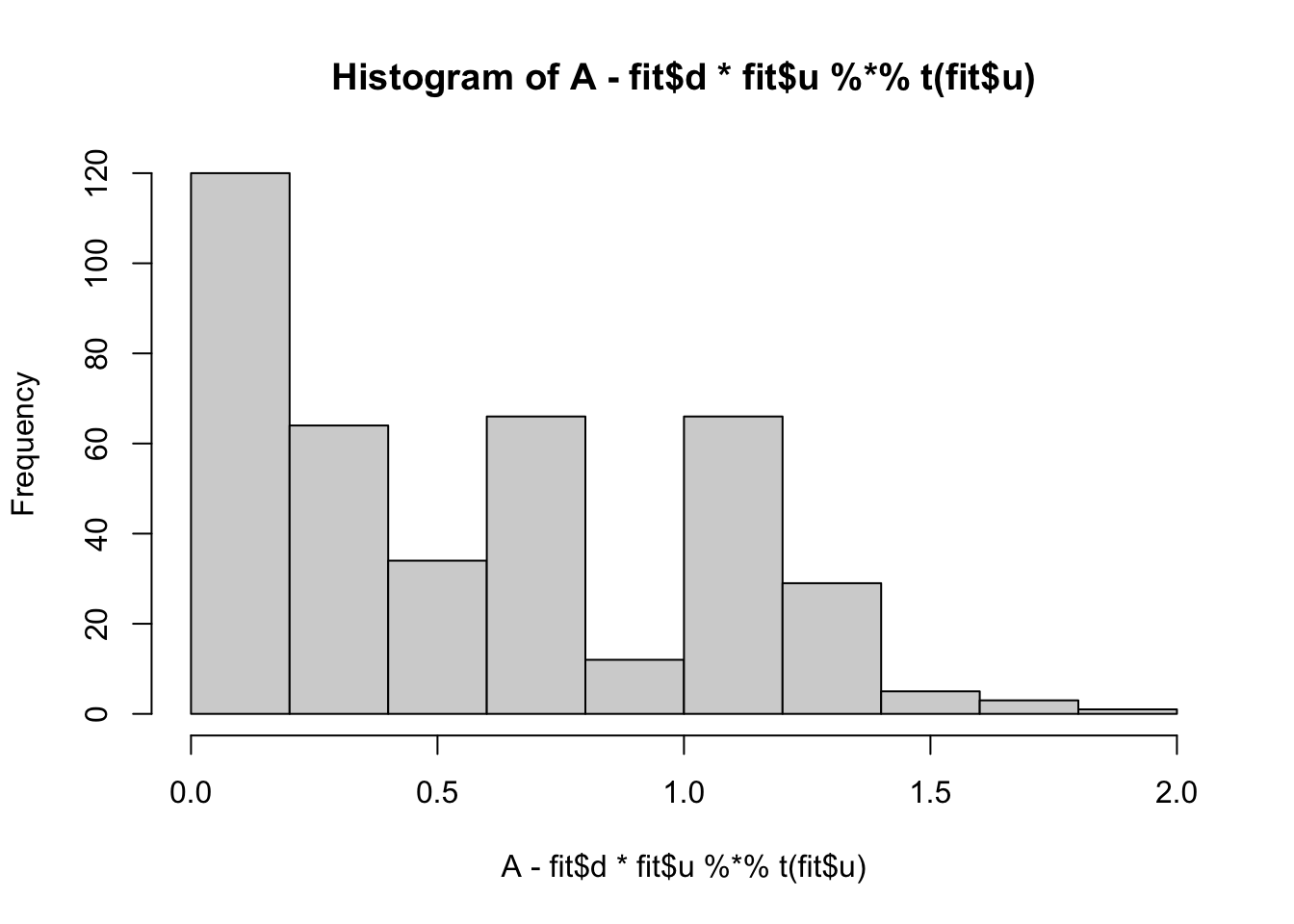
fit = nmu_em(A, 1, 0.1)
image(fit$u %*% t(fit$u))
| Version | Author | Date |
|---|---|---|
| eb0b82b | Matthew Stephens | 2025-02-26 |
min(A- fit$d * fit$u %*% t(fit$u))[1] 0.008737816hist(A- fit$d * fit$u %*% t(fit$u))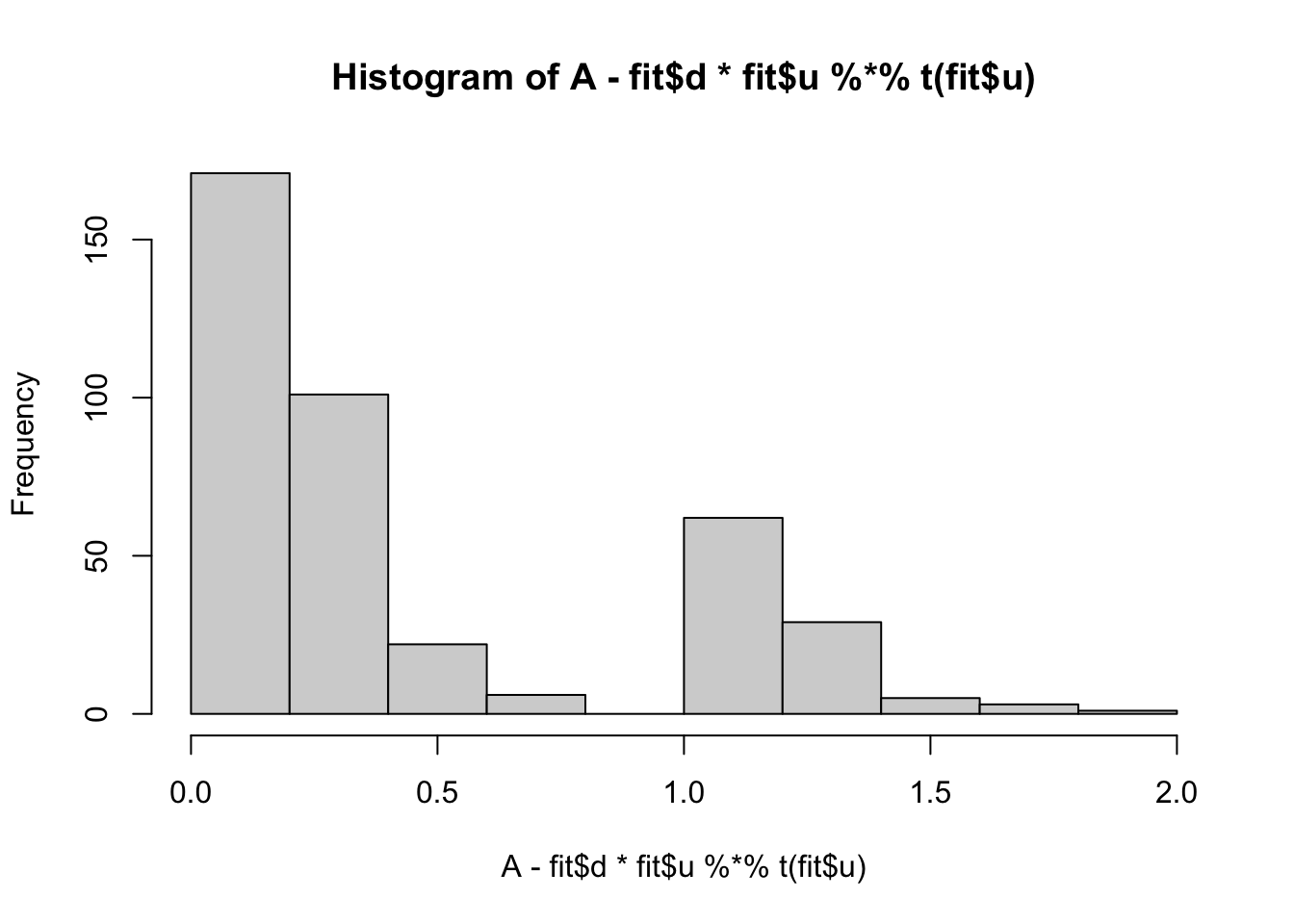
Note: if lambda is too small then the fit gets absorbed into u instead of b. This makes sense.
fit = nmu_em(A, .1, 1)
image(fit$u %*% t(fit$u))
image(fit$b)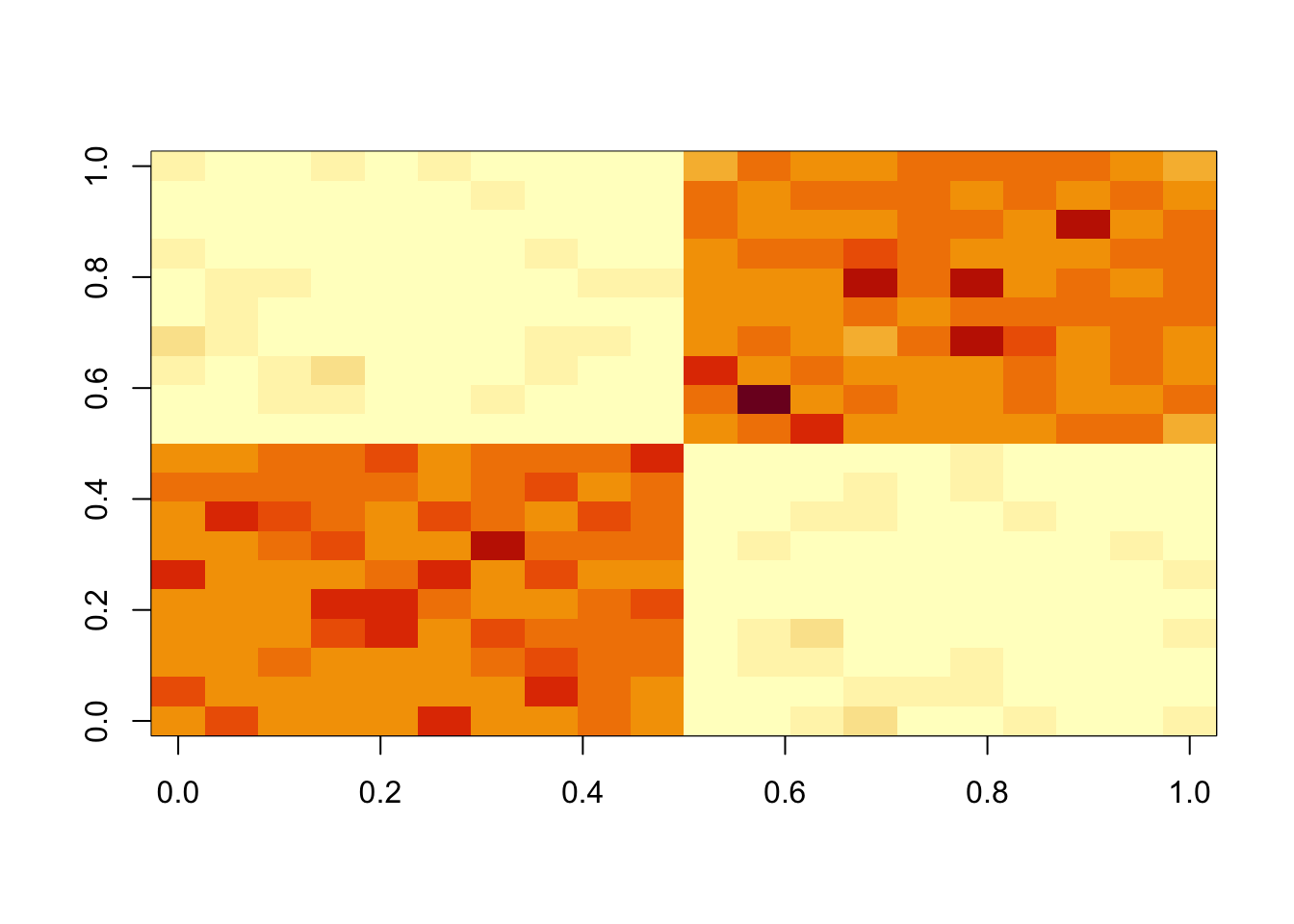
More generally, if lambda and sigma are not appropriate this is unlikely to work well:
fit = nmu_em(A, 100, 100)
image(fit$u %*% t(fit$u))
| Version | Author | Date |
|---|---|---|
| eb0b82b | Matthew Stephens | 2025-02-26 |
image(fit$b)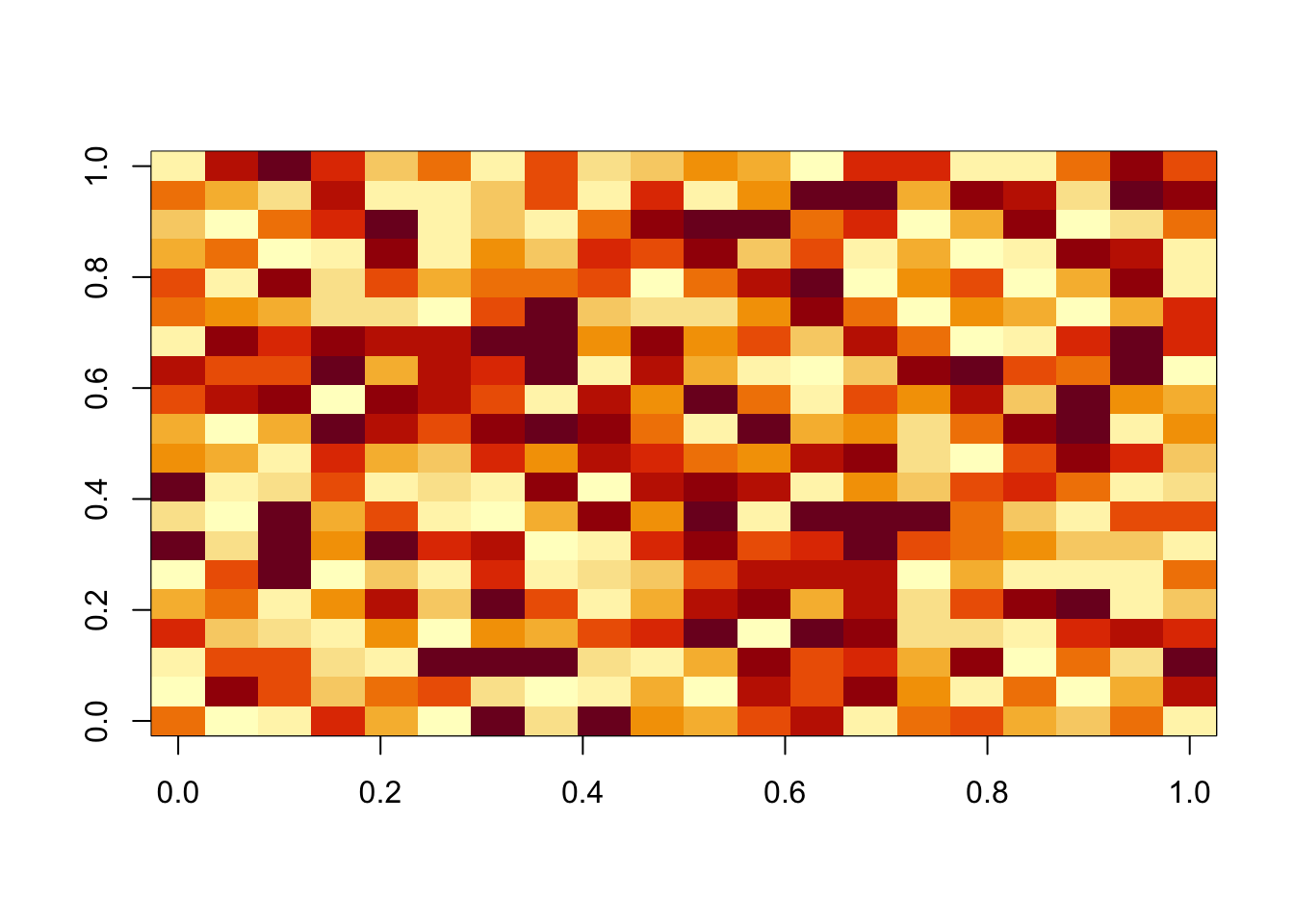
Note: i did try applying this, accidentally, to a matrix where some A were negative, so there is no underapproximation solution. It still did something sensible!
Estimating lambda and sigma
Note that \[E(A-uv') = 1/\lambda\] and \[E(A-uv')^2 = 1/\lambda^2 + \sigma^2\].
So a method of moments suggests estimating \(\lambda = 1/mean(A-uv')\) and \(\sigma^2 = mean((A-uv')^2) - mean(A-uv')^2 = var(A-uv')\).
The following code implements this idea (repeats fitting nmu 5 times, re-estimating lambda and sigma using the above after each time). Note that this is really just a first try. I think in practice, if we want an underapproximation, then we will want to do something to ensure that. Here I just initialize sigma to be small, but we need to think more about this, especially since we would like the method to be invariant to scaling of \(A\).
One possibility would be to initialize sigma to be the estimate based
on the first PC,
sigma= sqrt(mean((A - A.svd$d[1] * u %*% t(u))^2))
but maybe that is still too big since what we really want is that sigma
is the residual when all of the (nonnegative) factors are taken out.
Another possibility is to fix sigma by guessing that, say, the
nonnegative factors will, in total, explain 99% of the variance.
nmu_em_estlambda = function(A, maxiter=100, lambda=1, sigma=0.1){
b = matrix(0,nrow=nrow(A),ncol=ncol(A))
# initialize u by svd (check both u and -u since either could work)
A.svd = svd(A)
u = A.svd$u[,1]
u1 = trunc_and_norm(u)
u2 = trunc_and_norm(-u)
if(t(u1) %*% A %*% u1 > t(u2) %*% A %*% u2){
u = u1
} else {
u = u2
}
d = drop(t(u) %*% (A-b) %*% u)
for(j in 1:5){
for(i in 1:maxiter){
u = trunc_and_norm((A-b) %*% u)
d = drop(t(u) %*% (A-b) %*% u)
b = matrix(truncnorm::etruncnorm(a=0,mean= A-d*u %*% t(u)-lambda*sigma^2,sd=sigma),nrow=2*n)
}
lambda = 1/mean(A-d * u %*% t(u))
sigma = sd(A-d * u %*% t(u))
}
d = drop(t(u) %*% (A-b) %*% u)
return(list(u=u, d=d, b=b, lambda=lambda, sigma=sigma))
}Try it out:
fit = nmu_em_estlambda(A)
fit$lambda[1] 2.121926fit$sigma[1] 0.4388199image(fit$u %*% t(fit$u))
| Version | Author | Date |
|---|---|---|
| eb0b82b | Matthew Stephens | 2025-02-26 |
A tree
Try a tree, and iteratively removing factors. We can see this gives something close to the result we want.
set.seed(1)
n = 40
x = cbind(c(rep(1,n),rep(0,n)), c(rep(0,n),rep(1,n)), c(rep(1,n/2),rep(0,3*n/2)), c(rep(0,n/2), rep(1,n/2), rep(0,n)), c(rep(0,n),rep(1,n/2),rep(0,n/2)), c(rep(0,3*n/2),rep(1,n/2)))
E = matrix(0.1*rexp(2*n*2*n),nrow=2*n)
E = E+t(E) #symmetric errors
A = x %*% t(x) + E
image(A)
| Version | Author | Date |
|---|---|---|
| eb0b82b | Matthew Stephens | 2025-02-26 |
fit = nmu_em_estlambda(A)
fit$lambda[1] 1.528875fit$sigma[1] 0.7285704image(fit$u %*% t(fit$u))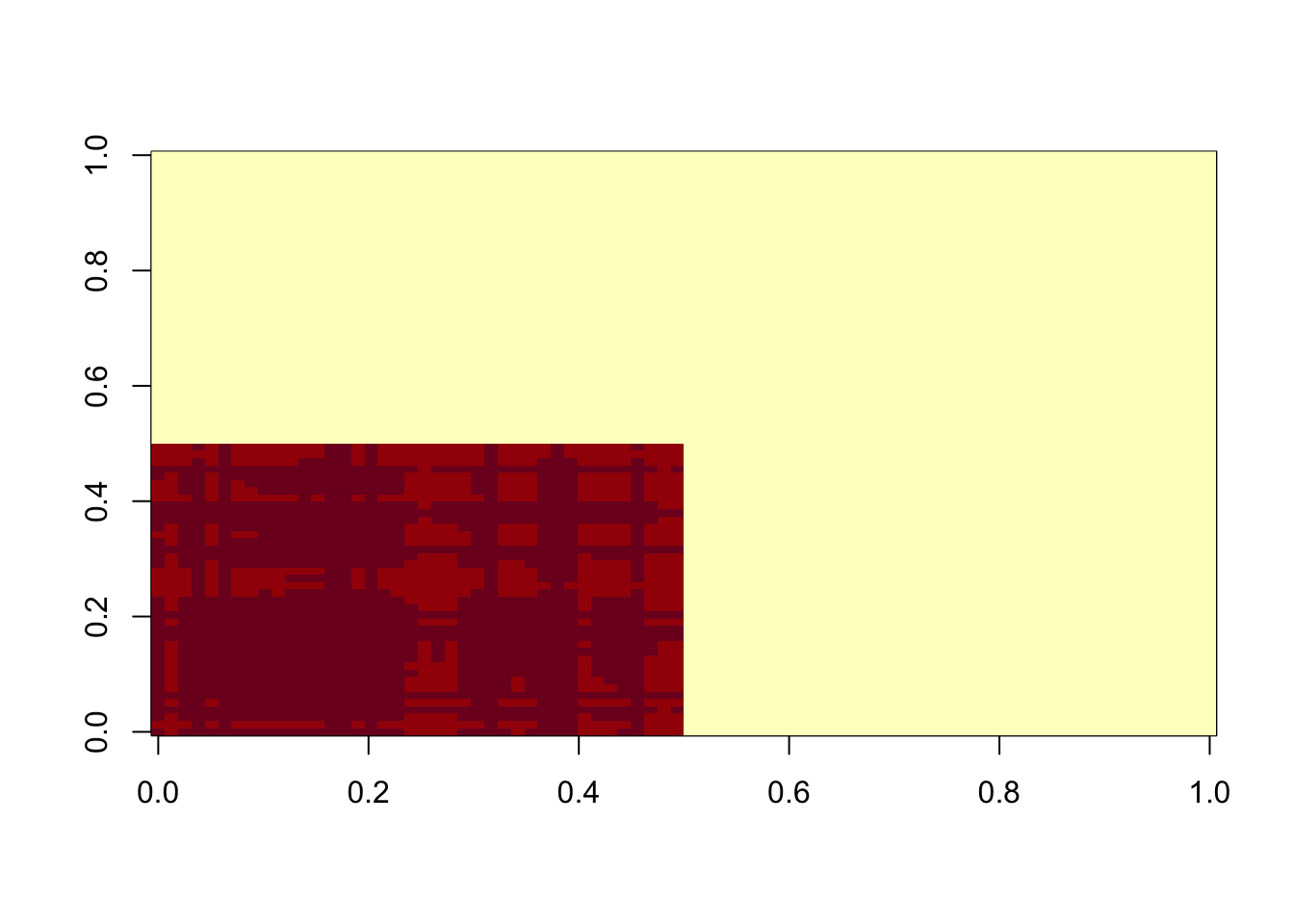
| Version | Author | Date |
|---|---|---|
| eb0b82b | Matthew Stephens | 2025-02-26 |
A = A-fit$d*fit$u %*% t(fit$u)
fit = nmu_em_estlambda(A)
image(fit$u %*% t(fit$u))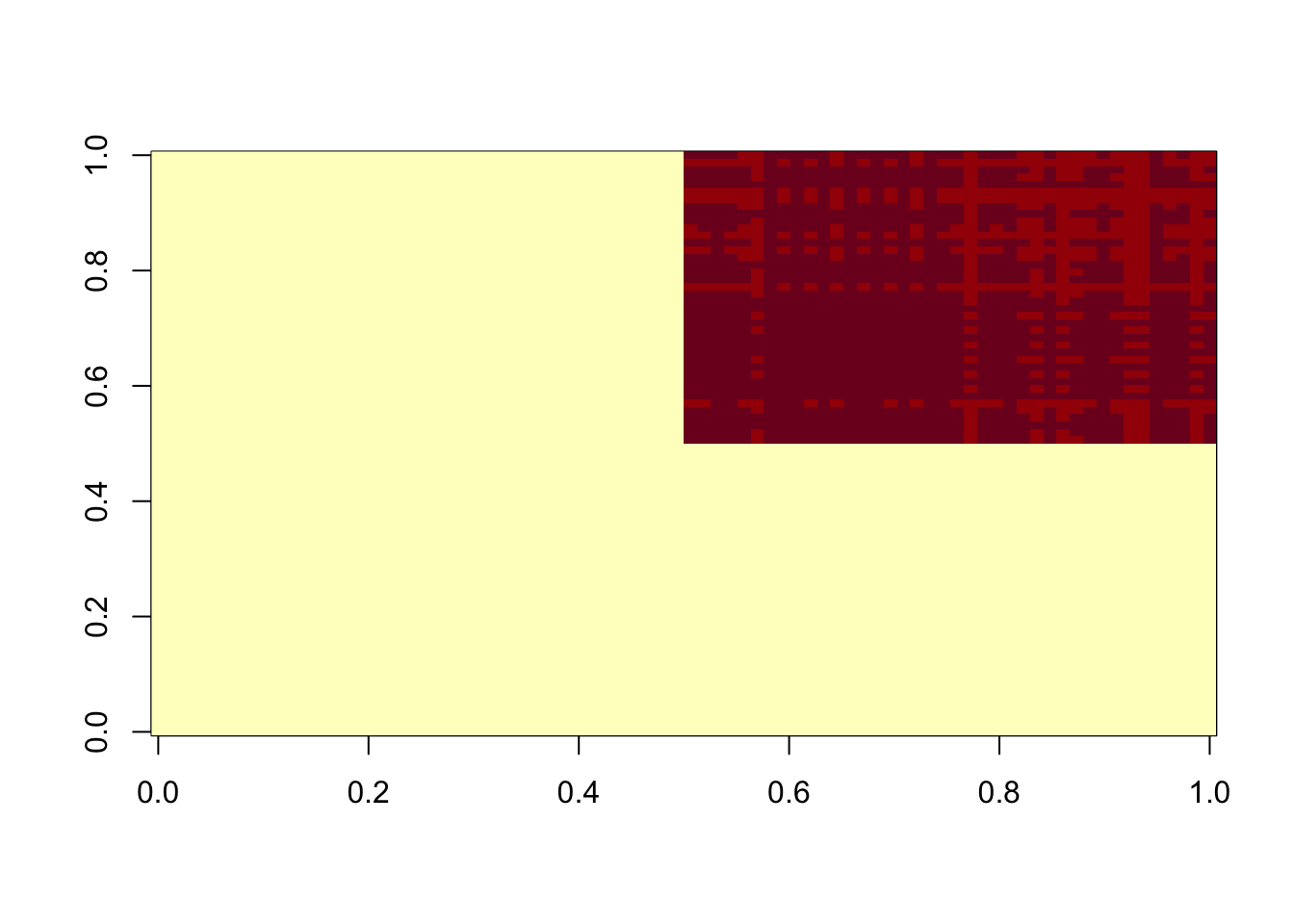
A = A-fit$d*fit$u %*% t(fit$u)
fit = nmu_em_estlambda(A)
image(fit$u %*% t(fit$u))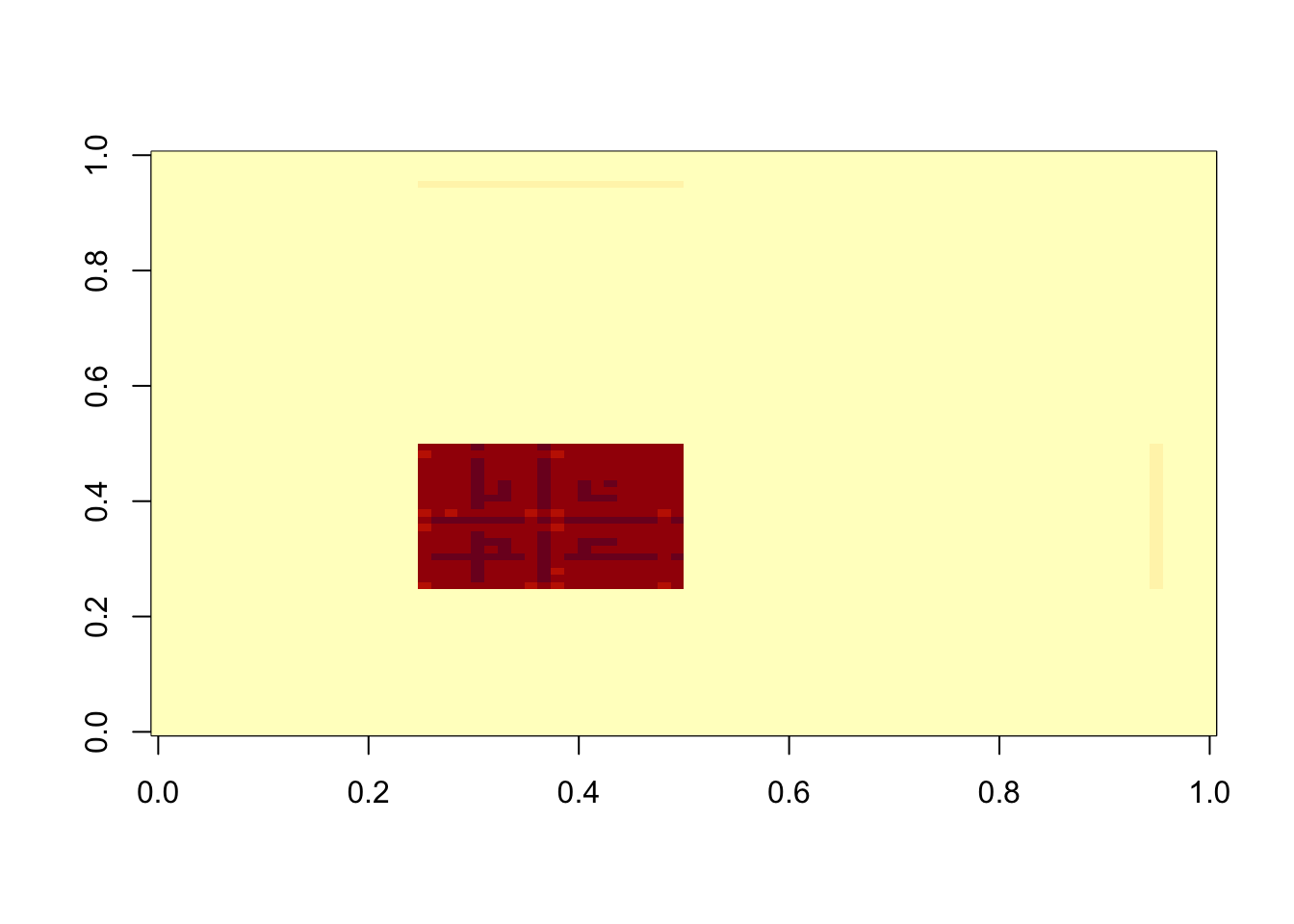
A = A-fit$d*fit$u %*% t(fit$u)
fit = nmu_em_estlambda(A)
image(fit$u %*% t(fit$u))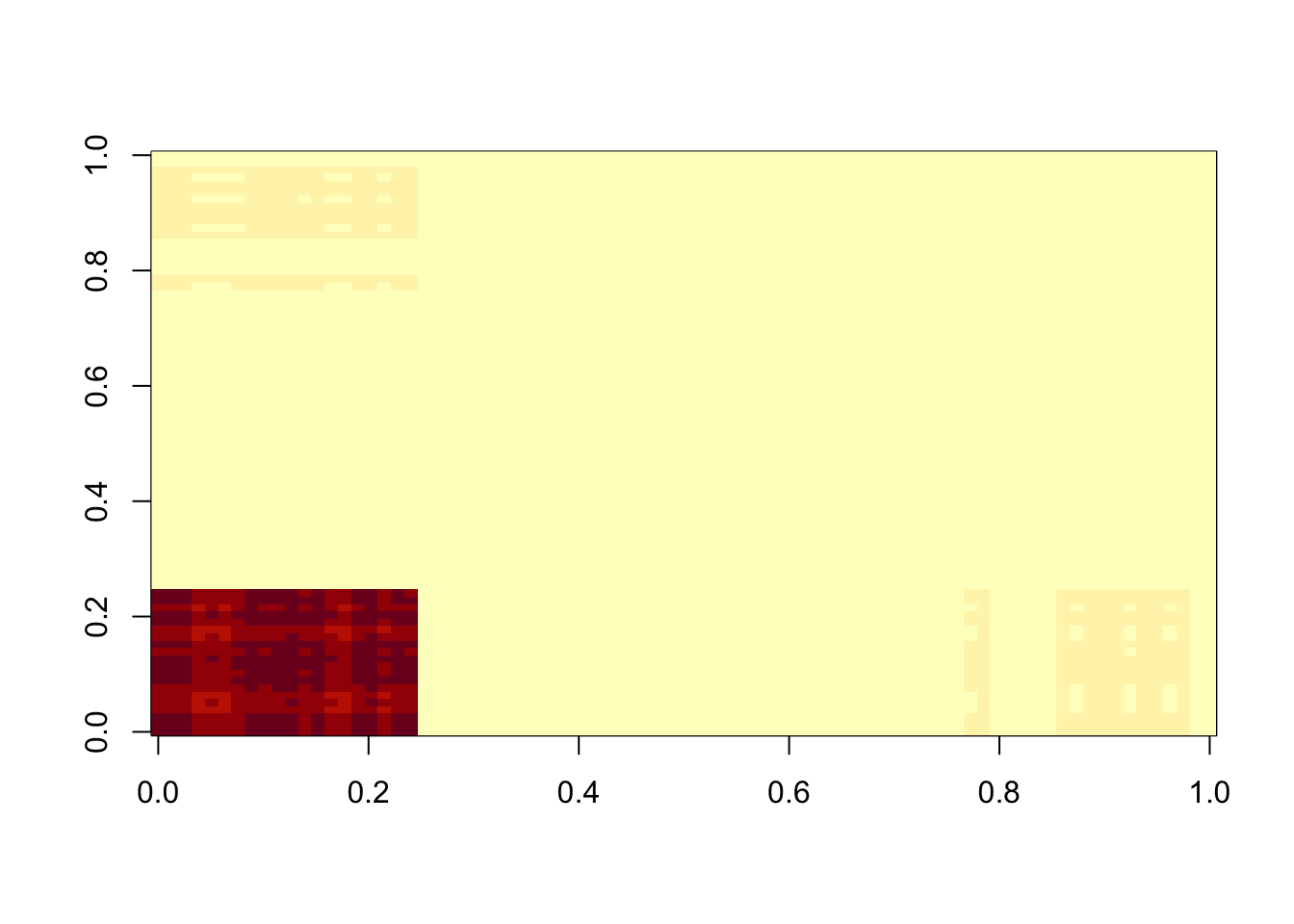
A = A-fit$d*fit$u %*% t(fit$u)
fit = nmu_em_estlambda(A)
image(fit$u %*% t(fit$u))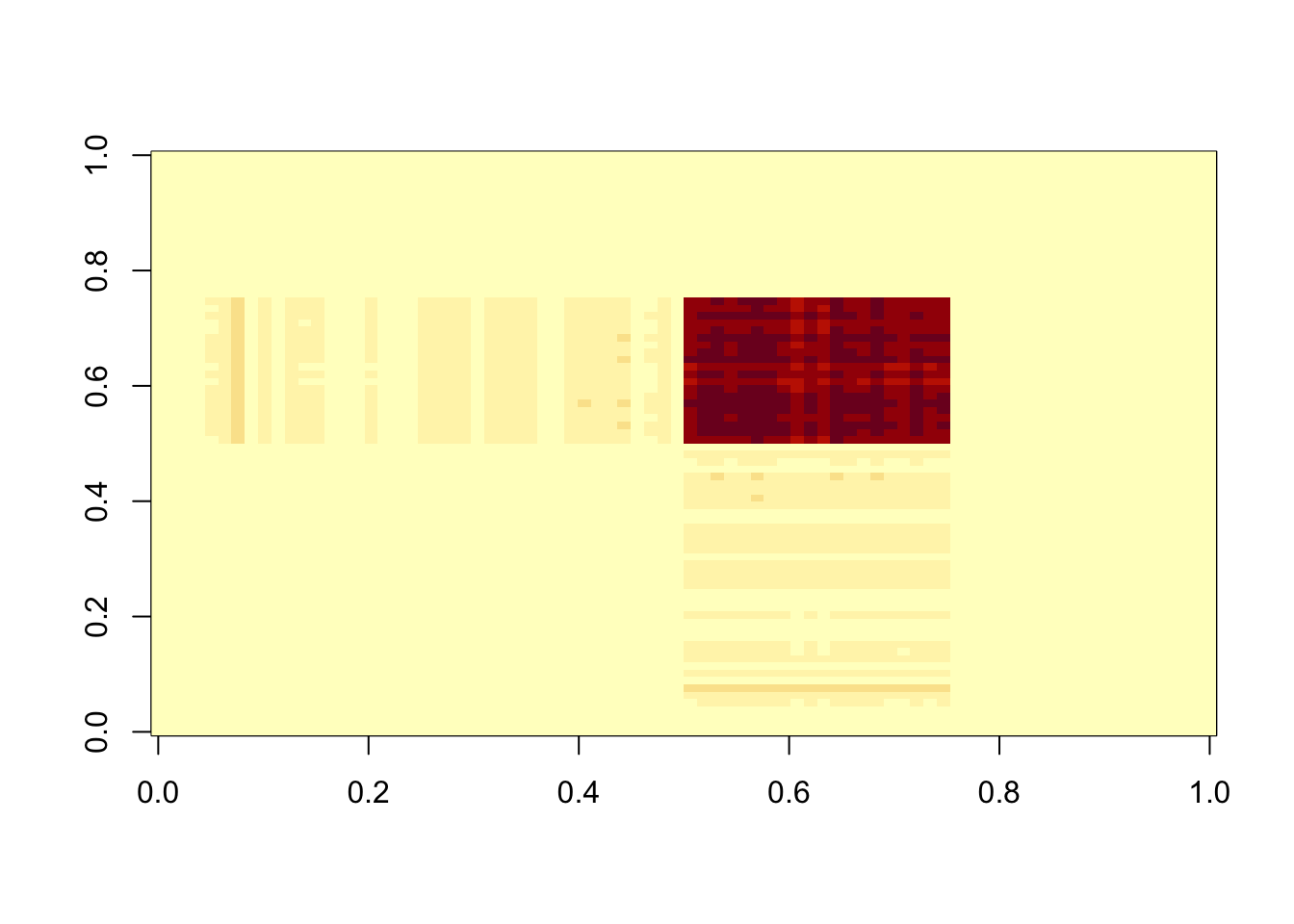
A = A-fit$d*fit$u %*% t(fit$u)
fit = nmu_em_estlambda(A)
image(fit$u %*% t(fit$u))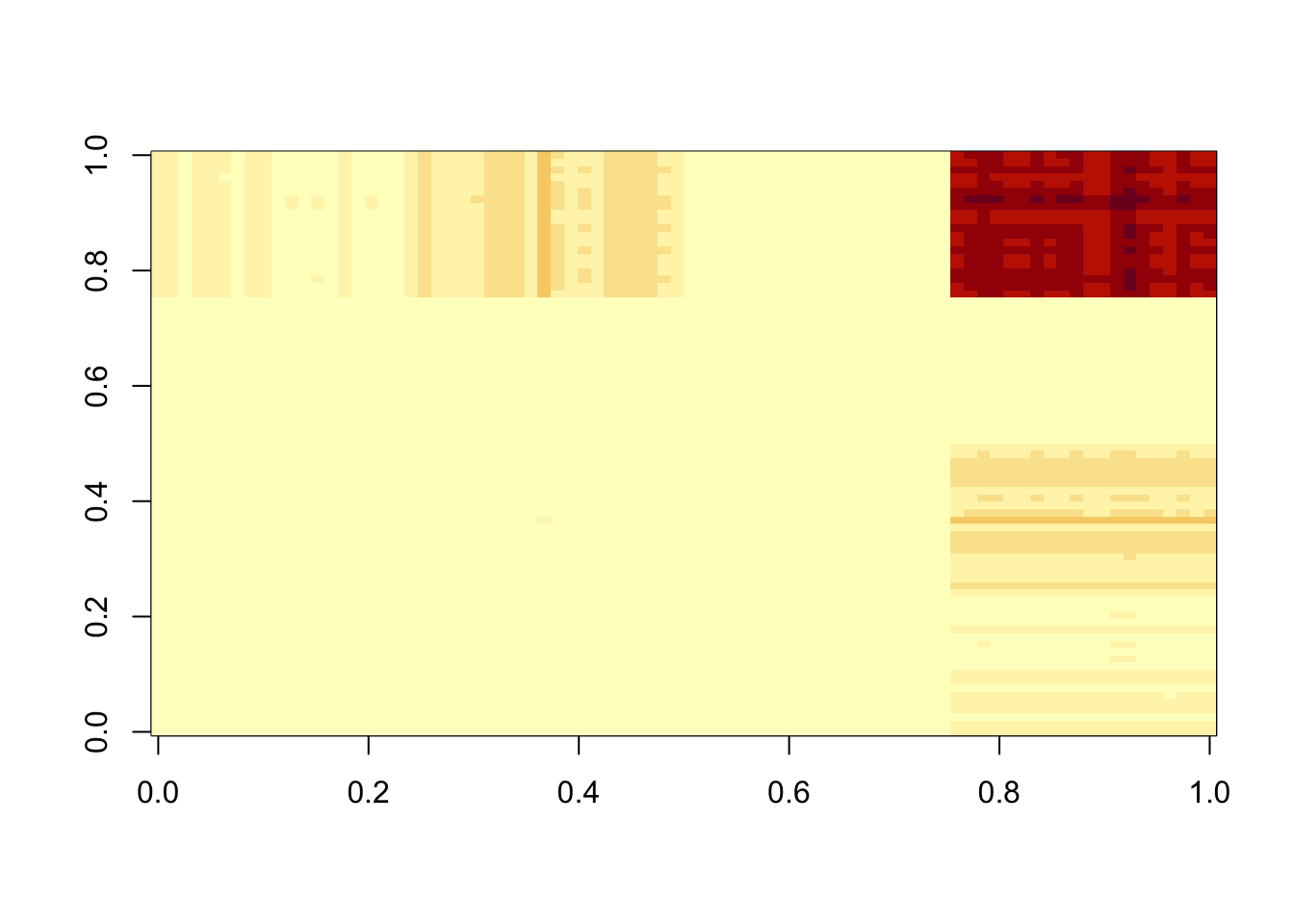
A = A-fit$d*fit$u %*% t(fit$u)
fit = nmu_em_estlambda(A)
image(fit$u %*% t(fit$u))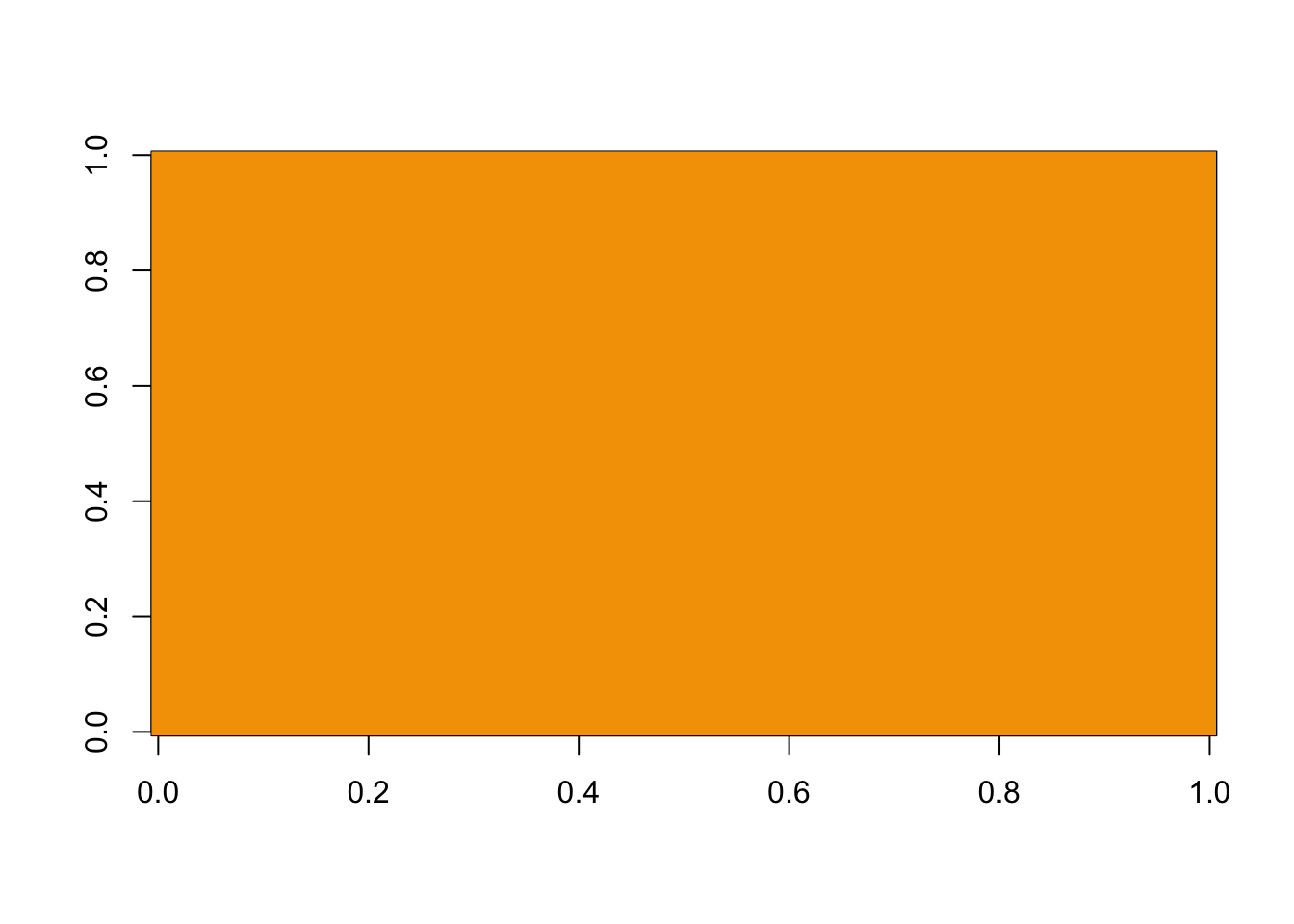
Further thoughts; scaling
I’m not entirely satisfied with the way we estimate lambda,sigma - that needs some thought I think.
Also, I note that the result can depend on the scale of \(A,\lambda, \sigma\). We might want to frame the problem a bit differently to avoid that… eg by \(A = \sigma(uv'+b+e)\) where \(e \sim N(0,1)\) and \(b \sim Exp(\lambda)\). This could help make the approach scale invariant – that is, multiplying A by a constant would effectively not change the solution – which seems desirable. (Another simpler way to do this would be to simply to scale A to have mean squared values of 1 before proceeding.)
We could try \[A = \sigma(uv' + b + e)\] where \(u,v\) non-negative, \(e \sim N(0,1)\) and \(b\sim Exp(lambda)\).
The ELBO is \[F(u,v,q)= E_q((-1/2\sigma^2)||A-\sigma uv'-\sigma b||_2^2) + D_{KL}(q,g)\] where \(g\) is the prior on \(b\), \[g(b)=\lambda \exp(-\lambda b).\] Here \(q\) plays the role of the (approximate) posterior distribution on \(b\).
Given \(q\), this is minimized for \(u,v\) by solving \[\min_{u,v} ||A/\sigma -\bar{b} - uv'||_2^2\]
Given \(u,v\) this is minimized by for each \(b_{ij}\) by solving \[q(b) \propto g(b) \exp((-1/2)(x_{ij} - b)^2) \propto \exp((-1/2)[b^2-2(x_{ij}-\lambda)b])\] where \(x_{ij} = A_ij/\sigma - u_i v_j\). This is a truncated normal distribution, \[q(b_{ij}) = N_+(x_{ij}-\lambda, 1)\].
sessionInfo()R version 4.4.2 (2024-10-31)
Platform: aarch64-apple-darwin20
Running under: macOS Sequoia 15.3
Matrix products: default
BLAS: /Library/Frameworks/R.framework/Versions/4.4-arm64/Resources/lib/libRblas.0.dylib
LAPACK: /Library/Frameworks/R.framework/Versions/4.4-arm64/Resources/lib/libRlapack.dylib; LAPACK version 3.12.0
locale:
[1] en_US.UTF-8/en_US.UTF-8/en_US.UTF-8/C/en_US.UTF-8/en_US.UTF-8
time zone: America/Chicago
tzcode source: internal
attached base packages:
[1] stats graphics grDevices utils datasets methods base
loaded via a namespace (and not attached):
[1] vctrs_0.6.5 cli_3.6.3 knitr_1.49 rlang_1.1.5
[5] xfun_0.50 stringi_1.8.4 promises_1.3.2 jsonlite_1.8.9
[9] workflowr_1.7.1 glue_1.8.0 rprojroot_2.0.4 git2r_0.35.0
[13] htmltools_0.5.8.1 httpuv_1.6.15 sass_0.4.9 rmarkdown_2.29
[17] evaluate_1.0.3 jquerylib_0.1.4 tibble_3.2.1 fastmap_1.2.0
[21] yaml_2.3.10 lifecycle_1.0.4 whisker_0.4.1 stringr_1.5.1
[25] compiler_4.4.2 fs_1.6.5 Rcpp_1.0.14 pkgconfig_2.0.3
[29] rstudioapi_0.17.1 later_1.4.1 truncnorm_1.0-9 digest_0.6.37
[33] R6_2.5.1 pillar_1.10.1 magrittr_2.0.3 bslib_0.9.0
[37] tools_4.4.2 cachem_1.1.0